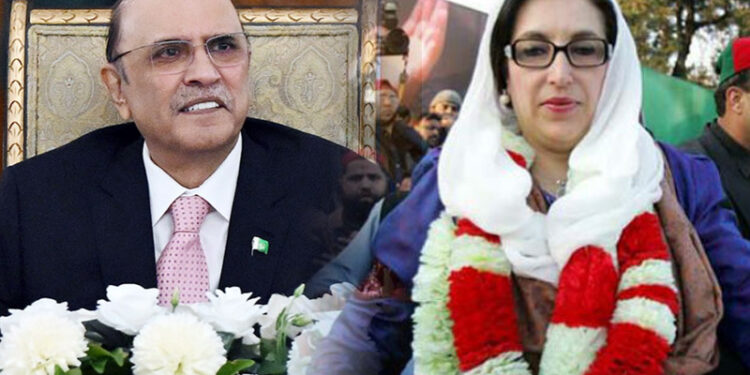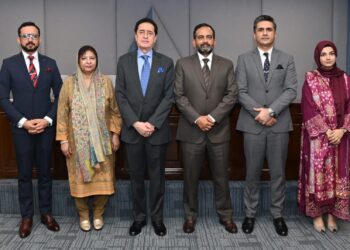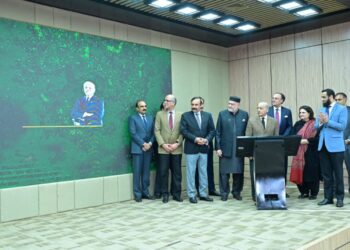On the occasion of the 72nd birth anniversary of Shaheed Mohtarma Benazir Bhutto, President Asif Ali Zardari paid glowing tribute to the late leader, acknowledging her monumental contributions to democracy, social justice, and the rights of the marginalized in Pakistan. He stated that Benazir Bhutto’s sacrifices, vision, and commitment to the people remain an enduring legacy for the Pakistan Peoples Party (PPP) and the nation at large.
A Tribute to a National Icon
In a heartfelt message, President Zardari emphasized that Benazir Bhutto’s legacy is more relevant today than ever before. Her life was a beacon of resilience in the face of tyranny and a symbol of unwavering faith in democratic values. As the first woman to lead a Muslim-majority country, she not only broke global political barriers but also became a voice for the voiceless, including women, minorities, and the working class.
“Benazir Bhutto resisted dictatorship with unmatched courage and perseverance,” President Zardari remarked. “She led the fight for the restoration of democracy, stood firm in her belief in the rule of law, and advocated for the supremacy of the Constitution.”
Benazir Bhutto: A Life of Service and Sacrifice
Born on June 21, 1953, in Karachi, Benazir Bhutto was the daughter of former Prime Minister Zulfikar Ali Bhutto, the founder of the PPP. Her political journey began at a young age, deeply shaped by her father’s ideology and vision for a socially equitable Pakistan.
After studying at Harvard University and Oxford University, she returned to Pakistan following the military coup against her father. Benazir was placed under house arrest several times during General Zia-ul-Haq’s dictatorship, but she never wavered in her demand for a return to democratic rule.
In 1988, following the end of military rule, Benazir Bhutto made history by becoming the first female Prime Minister of a Muslim-majority country. She served two non-consecutive terms (1988–1990 and 1993–1996), during which she championed women’s empowerment, poverty alleviation, and social welfare programs.
Champion of Democracy and Human Rights
Throughout her career, Benazir Bhutto advocated for human rights, freedom of the press, and judicial independence. She promoted education reform, expanded public health infrastructure, and pushed for progressive legislation to protect women’s rights.
She was also a vocal opponent of religious extremism. In the aftermath of the Soviet-Afghan war, when extremism was taking root in the region, Benazir warned of the long-term implications of militancy for regional stability. Her warnings proved prescient, as Pakistan later faced significant challenges from radicalization and terrorism.
Target of Political Vendettas and Ultimate Martyrdom
Benazir’s political career was marred by controversies, many of which were seen as politically motivated vendettas aimed at sidelining her from mainstream politics. She spent several years in exile but continued to play a central role in Pakistani politics.
On December 27, 2007, Benazir Bhutto was assassinated in Rawalpindi during an election campaign rally, a tragedy that shocked the world. Her death was not just the loss of a political leader but of a national symbol of democratic resistance. Millions mourned her across the globe.
Asif Zardari’s Continued Commitment to Benazir’s Vision
President Asif Ali Zardari, Benazir’s husband and a former President of Pakistan, has frequently credited her for inspiring him and shaping the PPP’s policy direction. On this solemn occasion, he reaffirmed his commitment to upholding her ideals, which include:
- Defending democratic institutions
- Protecting the rights of marginalized communities
- Promoting interfaith harmony
- Strengthening civilian supremacy
He emphasized that Benazir Bhutto will always be remembered as a torchbearer for democracy and women’s empowerment in Pakistan. “Her thoughts are still a beacon for the establishment of a just and democratic society,” Zardari stated.
Benazir Bhutto’s Enduring Impact on Pakistan’s Political Landscape
Benazir’s legacy lives on in the form of legislation, reforms, and political consciousness she helped instill in the Pakistani electorate. Under her leadership, the PPP continued to advocate for:
- Free and fair elections
- Equal representation of women in politics
- Judicial reforms
- Provincial autonomy
- Eradication of poverty through grassroots development
The Benazir Income Support Programme (BISP), launched in 2008 and named in her honor, remains one of the largest social safety nets in South Asia. It has provided financial support to millions of underprivileged families, particularly empowering women in rural areas.
PPP’s Pledge to Carry Forward Benazir’s Mission
In his statement, Zardari emphasized that the Pakistan Peoples Party remains steadfast in carrying forward Benazir Bhutto’s mission. He declared that the PPP will continue to strive for inclusive development, institutional integrity, and people-centric policies, as envisioned by the martyred leader.
“She will continue to be the champion of women’s social and economic autonomy,” Zardari said. “By adhering to her principles, we will ensure the protection of the fundamental rights of every citizen.”
The Role of Bilawal Bhutto Zardari: A New Chapter in PPP Leadership
Benazir Bhutto’s son, Bilawal Bhutto Zardari, currently serves as the Chairman of the PPP. He has repeatedly expressed his determination to fulfill his mother’s legacy and has become a central figure in national and international politics.
Under Bilawal’s leadership, the PPP has been focusing on youth engagement, climate change, and modernizing the party’s vision to meet the demands of the 21st century, all while staying true to Benazir’s ideological foundation.
National Tributes and Global Recognition
On her birth anniversary, political leaders, civil society members, women’s rights activists, and citizens across Pakistan took to social media and public forums to remember Benazir Bhutto’s legacy. Candlelight vigils, seminars, and discussions were held in cities including Karachi, Lahore, Islamabad, and Larkana, the Bhutto family’s political stronghold.
Internationally, leaders and diplomats acknowledged her contributions to global democracy and women’s leadership. She continues to be a role model for aspiring women politicians across the developing world.
Conclusion: A Legacy That Transcends Generations
Benazir Bhutto was not just a politician; she was a movement—a symbol of strength, endurance, and democratic resilience. Her vision for a progressive, inclusive, and peaceful Pakistan still resonates today. As Pakistan continues to face complex political, economic, and social challenges, her legacy serves as a guiding light for future generations.
President Asif Zardari’s tribute on her 72nd birth anniversary reiterates that Benazir Bhutto’s ideals will forever remain at the heart of the PPP’s philosophy, and her sacrifices will continue to inspire the struggle for a just, democratic, and equitable Pakistan.

























